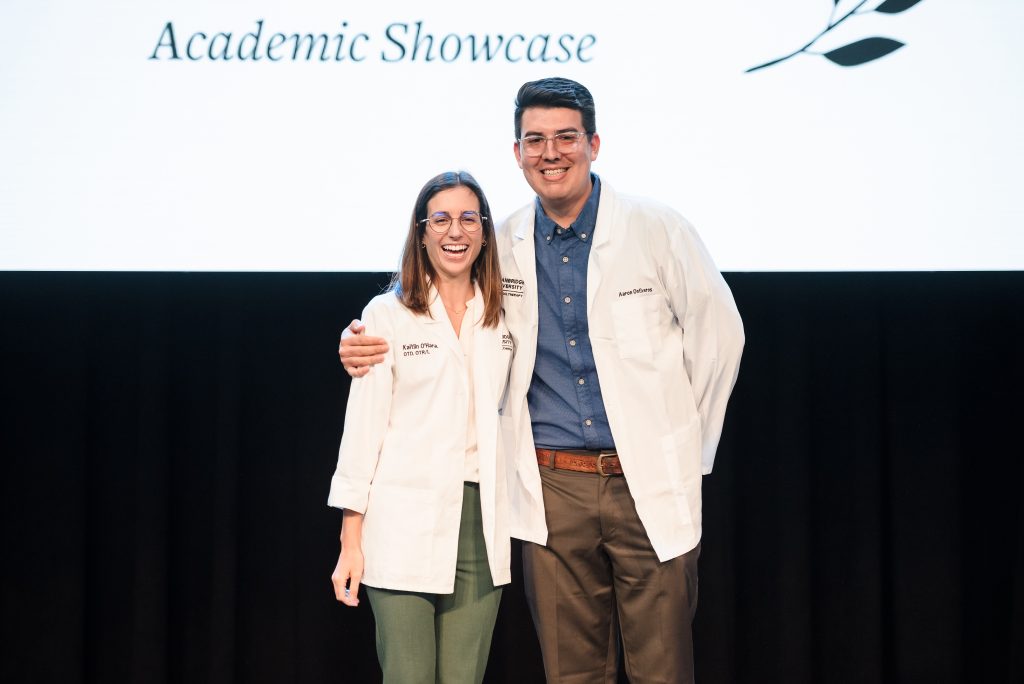Academic Showcase Spotlight: Occupational Therapy Student Aaron Ontiveros
Stanbridge University proudly presents Student Stories, highlighting the diverse and inspiring experiences of our healthcare students. This week’s feature follows Aaron Ontiveros, a Master of Science in Occupational Therapy (MSOT) student who, alongside his thesis group advised by Dr. Bill Wong, OTD, OTR/L, achieved an impressive milestone – presenting research at Stanbridge University’s Winter 2022 Academic Showcase.
What inspired you to pursue Occupational Therapy?

Before Occupational Therapy (OT), I wanted to become a Child Protective Services worker. I was a paraeducator working for a special education school, and I was apprehensive about becoming emotionally overwhelmed and drained from the job’s demands.
I eventually had the opportunity to work alongside occupational therapists in classroom settings. I was amazed at their ability to work with the students, especially in the area of feeding. I researched on my own and found that OT was a perfect blend of biomechanical, cognitive, and psychosocial approaches to help individuals of various conditions and populations. It was more aligned with my traits, attributes, and work ethic to help others and continue educating myself on effective approaches with diverse populations throughout my career.
Briefly describe what your thesis is about.
Our study, “Perceptions of Occupational Therapy and Occupational Therapy Assistant Students Serving Autistic Adults 50 Years and Older,” aims to identify gaps in healthcare to increase the quality of life for autistic older adults. It will be a pilot study of a larger cross-cultural research project to be completed in 2023. The objective is to explore the readiness and competence of occupational therapy students to work with autistic older adults.
How is your OT research conducted?
A mixed methods methodology is adopted via an online survey that consists of a Likert scale, multiple choice, and open-ended questions. Target participants are graduate OT students, and recruitment will be through word of mouth and online methodologies. Results describe exposure to this population in acquaintances, employers and volunteers, and within the family.
What were your early findings?
The data highlights that while most participants have had experiences with autistic individuals through family, work or volunteer roles, and acquaintances, most were unable to describe an experience with an older autistic adult. These findings will guide proper training and fill unidentified gaps by informing OT school curriculum.
What drew you towards the topic of autism in older adults?
The first topic I selected for my thesis research involved school-based OT interventions and approaches. I chose this because I worked at a special education school for five years before starting Stanbridge’s Master of Science in Occupational Therapy program. I was eventually placed in the present group, which I was extremely happy about.
I love researching autism. Every individual has a unique personality, preferences, and methods for expression. I believe everything happens for a reason, and I would like to believe that I was destined to research the perceptions of older autistic adults. I had little knowledge of this topic and the older autistic adult population before researching, and I had years of prior experience in a school setting. It worked out for the best.
Why are there are gaps in autism research for older adults?
One question our thesis presentation sought to explore was why the pediatric population is studied and researched so extensively compared to older adults with the same condition. Many factors contribute to the gaps in research, but one factor is that autism was not diagnosed in many individuals in past generations. These individuals grew and developed into adolescence, early, middle, and late adulthood with undiagnosed autism.
There is a misconception that autism is more common in the present day. However, this is due to thorough and efficient assessments and a heightened awareness and understanding. The majority of longitudinal studies were conducted within the past twenty years. Even though this is an excellent start to understanding how this condition changes throughout the lifespan, more research is needed to understand the long-term changes and implications.
What challenges have you faced while working on your thesis project?
Finding the right balance between studying, personal time, and thesis requirements was challenging. However, I made time to accurately research and revise to where I felt proud to share my work.
Learn more about Stanbridge University’s Master of Science in Occupational Therapy program.